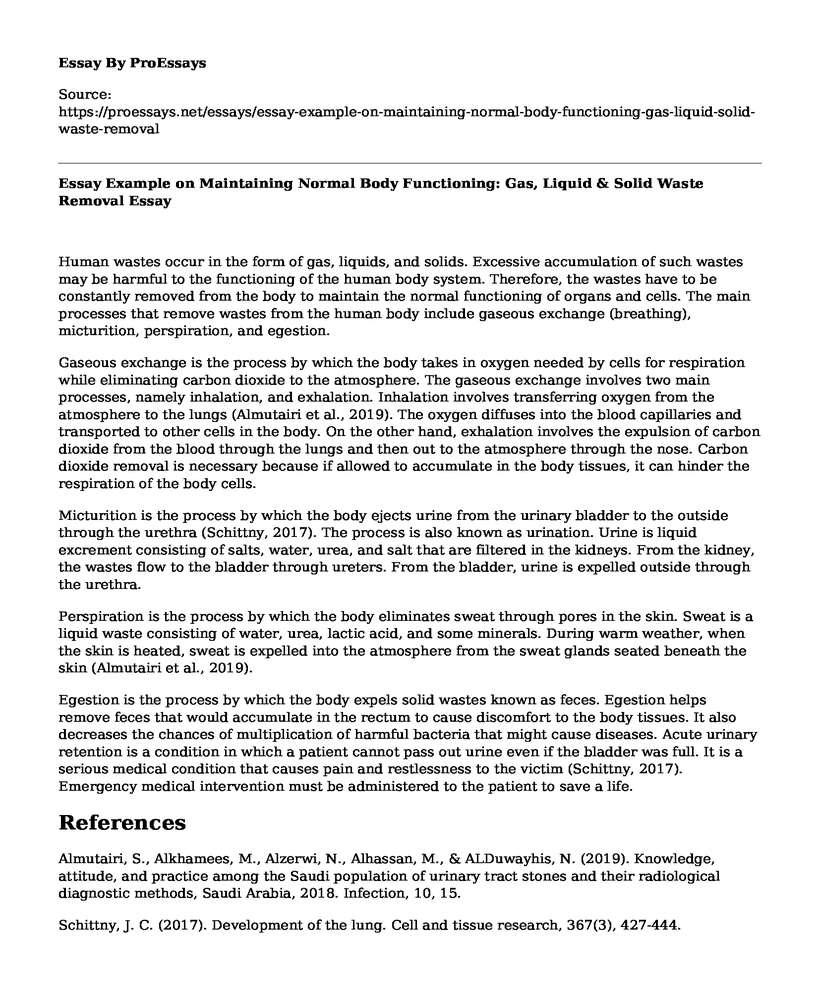Human wastes occur in the form of gas, liquids, and solids. Excessive accumulation of such wastes may be harmful to the functioning of the human body system. Therefore, the wastes have to be constantly removed from the body to maintain the normal functioning of organs and cells. The main processes that remove wastes from the human body include gaseous exchange (breathing), micturition, perspiration, and egestion.
Gaseous exchange is the process by which the body takes in oxygen needed by cells for respiration while eliminating carbon dioxide to the atmosphere. The gaseous exchange involves two main processes, namely inhalation, and exhalation. Inhalation involves transferring oxygen from the atmosphere to the lungs (Almutairi et al., 2019). The oxygen diffuses into the blood capillaries and transported to other cells in the body. On the other hand, exhalation involves the expulsion of carbon dioxide from the blood through the lungs and then out to the atmosphere through the nose. Carbon dioxide removal is necessary because if allowed to accumulate in the body tissues, it can hinder the respiration of the body cells.
Micturition is the process by which the body ejects urine from the urinary bladder to the outside through the urethra (Schittny, 2017). The process is also known as urination. Urine is liquid excrement consisting of salts, water, urea, and salt that are filtered in the kidneys. From the kidney, the wastes flow to the bladder through ureters. From the bladder, urine is expelled outside through the urethra.
Perspiration is the process by which the body eliminates sweat through pores in the skin. Sweat is a liquid waste consisting of water, urea, lactic acid, and some minerals. During warm weather, when the skin is heated, sweat is expelled into the atmosphere from the sweat glands seated beneath the skin (Almutairi et al., 2019).
Egestion is the process by which the body expels solid wastes known as feces. Egestion helps remove feces that would accumulate in the rectum to cause discomfort to the body tissues. It also decreases the chances of multiplication of harmful bacteria that might cause diseases. Acute urinary retention is a condition in which a patient cannot pass out urine even if the bladder was full. It is a serious medical condition that causes pain and restlessness to the victim (Schittny, 2017). Emergency medical intervention must be administered to the patient to save a life.
References
Almutairi, S., Alkhamees, M., Alzerwi, N., Alhassan, M., & ALDuwayhis, N. (2019). Knowledge, attitude, and practice among the Saudi population of urinary tract stones and their radiological diagnostic methods, Saudi Arabia, 2018. Infection, 10, 15.
Schittny, J. C. (2017). Development of the lung. Cell and tissue research, 367(3), 427-444.
Cite this page
Essay Example on Maintaining Normal Body Functioning: Gas, Liquid & Solid Waste Removal. (2023, Aug 31). Retrieved from https://proessays.net/essays/essay-example-on-maintaining-normal-body-functioning-gas-liquid-solid-waste-removal
If you are the original author of this essay and no longer wish to have it published on the ProEssays website, please click below to request its removal:
- Vaccine Controversy Effect on Nurses Essay
- Why Abortion Should Be Legalized Essay Example
- The Rohingya Community Essay Example
- Paper Example on Unravelling the Pathophysiologya of Onychomycosis
- Giving is Greatest Gift: Nurses at the Heart of Healthcare - Essay Sample
- Nurse Deb's Case: Evidence Needed to Win Wrongful Termination Suit - Case Study Example
- Free Essay Sample on Healthy Lifestyle Resources in NYC







